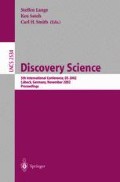Abstract
Data Mining, or Knowledge Discovery in Databases, is a fairly young research area that has emerged as a reply to the flood of data we are faced with nowadays. It tries to meet the challenge to develop methods that can help human beings to discover useful patterns in their data. One of these techniques - and definitely one of the most important, because it can be used for such frequent data mining tasks like classifier construction and dependence analysis - is learning graphical models from datasets of sample cases. In this paper we review the ideas underlying graphical models, with a special emphasis on the less well known possibilistic networks. We discuss the main principles of learning graphical models from data and consider briefly some algorithms that have been proposed for this task as well as data preprocessing methods and evaluation measures.
Access this chapter
Tax calculation will be finalised at checkout
Purchases are for personal use only
Preview
Unable to display preview. Download preview PDF.
References
[Andersen et al. 1989]_S.K. Andersen, K.G. Olesen, F.V. Jensen, and F. Jensen. HUGIN-A Shell for Building Bayesian Belief Universes for Expert Systems. Proc. 11th Int. J. Conf. on Artificial Intelligence (IJCAI’89, Detroit, MI, USA), 1080–1085. Morgan Kaufmann, San Mateo, CA, USA 1989
[Baldwin et al. 1995]_J.F. Baldwin, T.P. Martin, and B.W. Pilsworth. and Evidential Reasoning in Artificial Intelligence. Research Studies Press/J. Wiley & Sons, Taunton/Chichester, United Kingdom 1995
[Bauer et al. 1997]_E. Bauer, D. Koller, and Y. Singer. Update Rules for Parameter Estimation in Bayesian Networks. Proc. 13th Conf. on Uncertainty in Artificial Intelligence (UAI’97, Providence, RI, USA), 3–13. Morgan Kaufmann, San Mateo, CA, USA 1997
C. Borgelt and R. Kruse. Graphical Models — Methods for Data Analysis and Mining. J. Wiley & Sons, Chichester, United Kingdom 2002
[Castillo et al. 1997]_E. Castillo, J.M. Gutierrez, and A.S. Hadi. Expert Systems and Probabilistic Network Models. Springer-Verlag, New York, NY, USA 1997
[Chickering et al. 1994]_D.M. Chickering, D. Geiger, and D. Heckerman. Learning Bayesian Networks is NP-Hard (Technical Report MSR-TR-94-17). Microsoft Research, Advanced Technology Division, Redmond, WA, USA 1994
C.K. Chow and C.N. Liu. Approximating Discrete Probability Distributions with Dependence Trees. IEEE Trans. on Information Theory 14(3):462–467. IEEE Press, Piscataway, NJ, USA 1968
G.F. Cooper and E. Herskovits. A Bayesian Method for the Induction of Probabilistic Networks from Data. Machine Learning 9:309–347. Kluwer, Dordrecht, Netherlands 1992
[Dempster et al. 1977]_A.P. Dempster, N. Laird, and D. Rubin. Maximum Likelihood from Incomplete Data via the EM Algorithm. Journal of the Royal Statistical Society (Series B) 39:1–38. Blackwell, Oxford, United Kingdom 1977
D. Dubois and H. Prade. Possibility Theory. Plenum Press, New York, NY, USA 1988
[Dubois et al. 1996]_D. Dubois, H. Prade, and R. Yager, eds. Fuzzy Set Methods in Information Engineering: A Guided Tour of Applications.J. Wiley & Sons, New York, NY, USA 1996
J. Gebhardt. Learning from Data: Possibilistic Graphical Models. Habilitation Thesis, University of Braunschweig, Germany 1997
J. Gebhardt and R. Kruse. The Context Model-An Integrating View of Vagueness and Uncertainty. Int. Journal of Approximate Reasoning 9:283–314. North-Holland, Amsterdam, Netherlands 1993
J. Gebhardt and R. Kruse. Learning Possibilistic Networks from Data. Proc. 5th Int. Workshop on Artificial Intelligence and Statistics (Fort Lauderdale, FL, USA), 233–244. Springer-Verlag, New York, NY, USA 1995
J. Gebhardt and R. Kruse. POSSINFER-A Software Tool for Possibilistic Inference. In: [Dubois et al. 1996], 407–418
R.V.L. Hartley. Transmission of Information. The Bell System Technical Journal 7:535–563. Bell Laboratories, Murray Hill, NJ, USA 1928
J.M. Hammersley and P.E. Clifford. Markov Fields on Finite Graphs and Lattices. Unpublished manuscript, 1971. Cited in: [Isham 1981]
D. Heckerman. Probabilistic Similarity Networks. MIT Press, Cambridge, MA, USA 1991
[Heckerman et al. 1995]_D. Heckerman, D. Geiger, and D.M. Chickering. Learning Bayesian Networks: The Combination of Knowledge and Statistical Data. Machine Learning 20:197–243. Kluwer, Dordrecht, Netherlands 1995
V. Isham. An Introduction to Spatial Point Processes and Markov Random Fields. Int. Statistical Review 49:21–43. Int. Statistical Institute, Voorburg, Netherlands 1981
[Kruse et al. 1994]_R. Kruse, J. Gebhardt, and F. Klawonn. Foundations of Fuzzy Systems, J. Wiley & Sons, Chichester, United Kingdom 1994.
S.L. Lauritzen and D.J. Spiegelhalter. Local Computations with Probabilities on Graphical Structures and Their Application to Expert Systems. Journal of the Royal Statistical Society, Series B, 2(50):157–224. Blackwell, Oxford, United Kingdom 1988
J. Pearl. Probabilistic Reasoning in Intelligent Systems: Networks of Plausible Inference. Morgan Kaufmann, San Mateo, CA, USA 1988 (2nd edition 1992)
J. Rissanen. A Universal Prior for Integers and Estimation by Minimum Description Length. Annals of Statistics 11:416–431. Institute of Mathematical Statistics, Hayward, CA, USA 1983
A. Saffotti and E. Umkehrer. PULCINELLA: A General Tool for Propagating Uncertainty in Valuation Networks. Proc. 7th Conf. on Uncertainty in Artificial Intelligence (UAI’91, Los Angeles, CA, USA), 323–331. Morgan Kaufmann, San Mateo, CA, USA 1991
P.P. Shenoy. Valuation-based Systems: A Framework for Managing Uncertainty in Expert Systems. In: [Zadeh and Kacprzyk 1992], 83–104
L.A. Zadeh and J. Kacprzyk. Fuzzy Logic for the Management of Uncertainty. J. Wiley & Sons, New York, NY, USA 1992
Author information
Authors and Affiliations
Editor information
Editors and Affiliations
Rights and permissions
Copyright information
© 2002 Springer-Verlag Berlin Heidelberg
About this paper
Cite this paper
Kruse, R., Borgelt, C. (2002). Data Mining with Graphical Models. In: Lange, S., Satoh, K., Smith, C.H. (eds) Discovery Science. DS 2002. Lecture Notes in Computer Science, vol 2534. Springer, Berlin, Heidelberg. https://doi.org/10.1007/3-540-36182-0_2
Download citation
DOI: https://doi.org/10.1007/3-540-36182-0_2
Published:
Publisher Name: Springer, Berlin, Heidelberg
Print ISBN: 978-3-540-00188-1
Online ISBN: 978-3-540-36182-4
eBook Packages: Springer Book Archive

